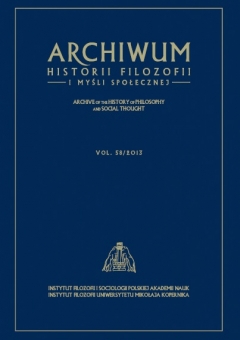Filon z Aleksandrii i problem genezy onto-teologii
Philo of Alexandria and the Origins of Onto-theology
Author(s): Seweryn BlandziSubject(s): Metaphysics, Ontology
Published by: Instytut Filozofii i Socjologii Polskiej Akademii Nauk
Keywords: Being; God; Onto-theology; metaphysics; first philosophy; Aristotle; Philo of Alexandria; Natorp; Heidegger;
Summary/Abstract: Seeking the sources of the radical formulation of the issue of metaphysics as onto-theology by M. Heidegger (1957), we find definitive analyses of Aristotle’s Metaphysics by P. Natorp (1888) and P. Aubenque (1983), and in more distant past, Philo’s of Alexandria (around 20 BC–40 AD) theological interpretation of being, probably inspired by Book Kappa of this work. Natorp was the first to demonstrate the contradiction in Aristole’s „first philosophy” in terms of its dual components, as this philosophy was understood, i.e. at the same time as a science of all being and of the Supreme Being. h is contradiction was a result of the failure to recognize that Aristotle had not written certain parts of Metaphysics (Book K in particular) on the one hand, and an erroneous interpretation of its genuine content on the other. Ignoring this important reservation, Heidegger attributed to Aristotle»s metaphysics the domination of the theological component over the ontological, although this reservation is not totally incorrect with respect to medieval metaphysics, which identified God with Being itself. h is identification is rooted in the imposition of the maximalist concept of being (originating in Parmenides and Plato) imposition on personal God. The first trace of the merging of those two ideas can already be found in the compiler of Book K in his theological understanding of Aristotle’s formula to on hē on (being as being), but the reference of this formula to God (hitherto unnoted by commentators) can be found explicitly in Philo, who we can treated as the actual originator of onto-theology. On the other hand, Aristotle’s genuine „First philosophy” could be ascribed at most to non-equivalent components: one general-ontological, focused on „being as being”, and the other, subordinate to it – the theological one, focused on the „highest genus”.
Journal: Archiwum Historii Filozofii i Myśli Społecznej
- Issue Year: 58/2013
- Issue No: 58
- Page Range: 59-72
- Page Count: 14
- Language: Polish

